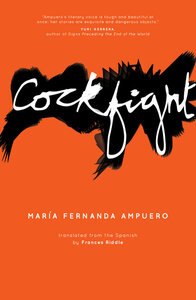July is Spanish Literature Month, hosted by Stu at Winston’s Dad and Richard at Caravana de recuerdos, and I have a few titles lined up for the blog. The theme for the first week of July is contemporary Latin American fiction, and I’ve chosen this story collection from Ecuador, published by Influx Press.
Ampuero’s stories shine a light into the darker corners of ordinary domestic life, and confront brutal subjects head-on. I have to say that this is one of the most harrowing books I’ve read in a long time.
The opening story, ‘Auction’, sets the tone. Ampuero’s narrator recalls cleaning up after her father’s cockfight as a girl, and how she would use the birds’ viscera to put off jeering men in the crowd. It then becomes clear that, as an adult, the narrator has been kidnapped by a taxi driver and taken to be auctioned off to the highest bidder. The only way she can save herself is to draw on her childhood experiences.
So you have a carefully drawn situation (in prose powerfully translated by Frances Riddle), with a closing shift into deeper darkness. The story ‘Griselda’ starts off more innocently, with the narrator telling us of Miss Griselda, who baked extraordinary cakes. But there are suggestions of what might be going on behind closed doors, until events reach a crescendo – and, afterwards, the narrator’s birthday cakes never taste as good again.
Much of Cockfight takes a pessimistic tone, but there are glimpses of light to be found. The protagonist of ‘Other’ is out shopping, constrained by the thoughts of what her husband wants buying, and the likely consequences for her if he doesn’t get it. A small act of rebellion at the end of the story may or may not turn out well, but there is at least the possibility of hope. It’s a precarious end to a vivid collection.












Recent Comments